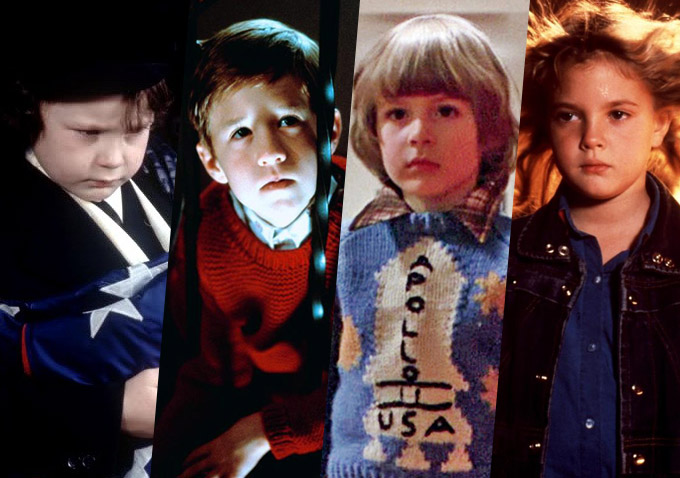We have such deeply-set assumptions about children and childhood — innocence, powerlessness, fundamental “goodness” — that any challenge to those notions is often met with incredulity or defensiveness. So the idea of the child endowed with unnatural powers that render him or her less than innocent, good, or obedient is fundamentally unsettling. It’s a concept that Hollywood has exploited time and again, sometimes for comic but more often for dramatic or horrific purposes. This theme crops up again in this week’s “Midnight Special” from director Jeff Nichols (our review here), in which the boy in question, the son of Kirsten Dunst and Michael Shannon‘s characters, has immense resources of potentially destructive, potentially Messianic powers that he is barely able to control. This puts his parents and their collaborators in the terrifying position of having to protect something they do not understand: they cannot even know if he is a force for good or evil, only that he is a force, he is in danger and he is their son.
READ MORE: The 30 Best Horror Films of the 1990s
Anticipating the release of “Midnight Special,” we’ve taken a moment to highlight 15 other examples of supernaturally powered children from the better films on the subject. Aside from keeping it to younger, prepubescent kids (so no “Carrie“) and excluding comic-book or young adult-based movies in which the child may develop his/her superpowers at a young age (like “Superman,” or “Harry Potter,” for example), our only guideline is that the films should be at least watchable (a surprising number are not) and should in some way hinge on the contradiction that is a child with distinctly un-childlike abilities and skills.
“Looper” (2012)
Perhaps the closest recent analog to “Midnight Special,” “Looper” not only boasts a similar melding of independent and genre film sensibilities, but it also places at its center a somewhat ambivalent, super-powered child, whose parents will do anything to protect him. But Rian Johnson‘s time-travel thriller is more twistily plotted than Nichols’ somber, lower-key drama, and is slightly less involved in ineffable existential and metaphysical questions. But only slightly: set in a world where one of the chief uses for black-market time travel is for gangsters to send back victims into the past for execution so no bodies exist to incriminate them, “Looper” really finds its feet (and its heart) in its second, more philosophical half. It’s then that hitman Joe (Joseph Gordon-Levitt), having failed to kill his future self (Bruce Willis) as ordered, meets little Cid (Pierce Gagnon), whose extraordinary telekinetic abilities mark him out as the fabled Rainmaker of the future — a malevolent all-powerful entity that Old Joe has vowed to eradicate. The convolutions of its plot and premise aside, the intelligent humanism of the approach is marked out by the characterization of Cid as neither good nor evil yet, just a huge mass of potential to become either.
 “The Omen” (1976)
“The Omen” (1976)
A sort of “Citizen Kane” of evil children movies, leading directly to a whole sub-genre of horror films including the likes of “Joshua” and “Orphan,” Richard Donner’s “The Omen” is a tremendously entertaining piece of pulp that walks the line neatly between being genuinely unnerving and deeply silly. The film sees Robert Thorn (Gregory Peck, bringing an invaluable degree of dignity to proceedings), the U.S. Ambassador to the U.K., beginning to suspect that something is wrong with his son, Damien and that his child may have actually been swapped at birth with the Antichrist, the child of Satan. The exact nature of Damien’s powers are never quite spelled out, beyond an obvious malevolence, but that actually helps the film’s metaphorical power to a degree: the film becomes a sort of prototypical “We Need To Talk About Kevin,” examining the greatest fears of a parent, that their beloved child could turn out to be, well, evil. Amid a distinguished cast (Billie Whitelaw as demented nanny Mrs. Baylock being the highlight), young Harvey Spencer Stephens does a fine job, his pageboy haircut only briefly concealing the child’s demonic nature. Steer clear of the 2006 remake though, an unimaginative Xerox of the original with nothing to recommend it.
READ MORE: The 25 Best Horror Films Of The 21st Century So Far
“Twilight Zone: The Movie” (1983)
There are technically two supernatural-kid segments in the 1983 anthology film based on the beloved TV show. Steven Spielberg‘s “Kick The Can” features a “Cocoon”-esque story of OAPs being transformed into their younger selves by “magical Negro” Scatman Crothers (and is as sickly as that sounds). But Joe Dante‘s “It’s a Good Life” is much better and more grotesque, even if it could have benefited from a less cheerful ending (perhaps one more akin to the TV episode on which it was based, which is widely cited as one of the best “Twilight Zones ever). Kathleen Quinlan plays a schoolteacher hoping for a fresh start when she accidentally (she thinks) backs into Anthony, a kid who has taken a shine to her. She drives him home but once there is pressured into staying by the child and his ghoulish “family.” Anthony is essentially omnipotent but being a child his wishes, fantasies, and punishments are mostly inspired by cartoons and cartoon logic, leading to some very Dante-esque puppetry and set design. (We should also mention in passing — considering the film that spawned this feature — the prologue and epilogue, both of which feature vehicles driving at night in which Creedence Clearwater Revival‘s “Midnight Special” plays.)
https://www.youtube.com/watch?v=zYiMxjfiZ60






AKIRA
Come Out and Play was the remake.
When Anthony takes away his sister\’s mouth. That still freaks me out.
Does anybody know the name of recent movie that is pretty much a remake of "Who Can Kill a Child?" I watched it on Netflix, but can\’t remember the title for the life of me. Anyhoo, during one of the "kids attack!" scenes, our hero hits a kid in the face with a blunt instrument and it was hilariously brutal.